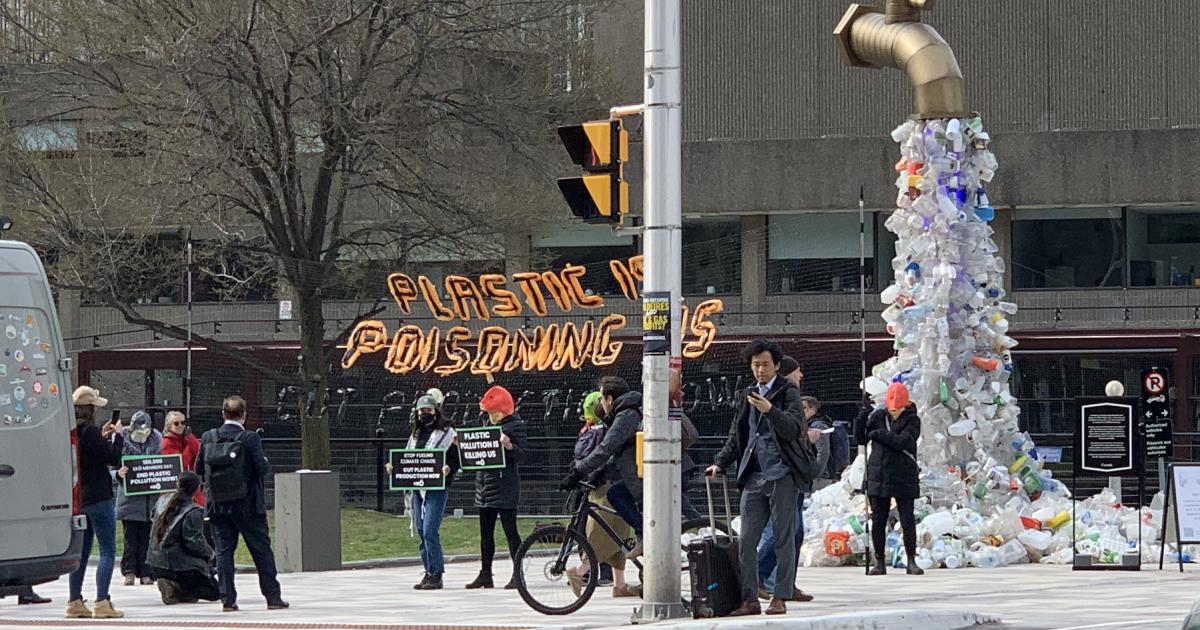
I’m in Ottawa at the fourth meeting of the United Nations’ Intergovernmental Negotiating Committee (INC-4) on a treaty to address global plastic pollution.
The fast-paced process started in March 2022 and is set to culminate with the final treaty language in Busan, South Korea, this fall.
At the last meeting in November, critics bemoaned the number of industry lobbyists trying to hijack the process. One-hundred-and-forty-three fossil fuel and chemical industry lobbyists attended, more than the delegates of the 70 smallest countries at the summit. That meeting ended with no agreement on targets, baselines, schedules or reporting mechanisms due to the foot-dragging of countries with major fossil fuel industries.
As a result, the tone heading into this week of negotiations was not overly optimistic.
Environmental NGOs and activists want these three things:
- Globally enforceable extended producer responsibility laws.
- A just and equitable transition.
- An overall reduction in plastic production.
Of the three goals, the first appears unlikely to emerge from this treaty process. The second goal has broad support, despite the difficulty of setting objective measures around it. The third goal, though, elicits the loudest rallying cry from activists.
So, are production caps imminent in the upcoming treaty? Far from it.
A group of ‘like-minded countries’
Several petrochemical-producing countries led by Saudi Arabia, Iran and China have used delaying tactics and calls for consensus to lower the overall ambition of the treaty. Because of the way the final language is drafted and adopted, this group holds power and makes production caps less likely.
In the opening plenary of INC-4, I saw these countries take to the microphone several times to raise process questions and stress the importance of “improved waste management” globally for the final treaty. These were clumsily veiled attempts to stall the negotiations and change the scope of work.
These were clumsily veiled attempts to stall the negotiations and change the scope of work.
The original resolution called for a treaty that “addresses the full lifecycle of plastic, including its production, design and disposal.” Most stakeholders participating in the treaty process agree with this goal, but the oil-producing countries are trying to change the rules in the middle of the game.
Chemical companies and polymer producers
The main stakeholders include the chemical industry and the oil companies that supply raw plastic materials. Without regulation or production caps, their motivation to reduce virgin plastic is less clear cut.
I spoke to people in Ottawa from a couple of chemical companies and came away with these themes:
- Many companies are building recycling infrastructure themselves to take advantage of their expertise in chemistry and engineering and to prepare for a future with lower virgin polymer demand. This includes investments by ExxonMobil, Dow and Eastman.
- These companies are thinking about diversifying their outputs. This may manifest as polymers for durable products, new high-performance polymers and other strategies to hedge against a future decrease in demand for single-use polymers. This diversification mitigates future risk as well.
- Lastly, and maybe most important, these companies are not immune to market shifts. If customers signal a shift away from single-use plastics, these companies will adapt.
This brings me to another key player in the plastic supply chain, consumer packaged goods companies, or CPGs.
CPG companies in the crosshairs
Speaking of market signals, consumer packaging is ultimately what litters our highways, beaches and parks. Consumers don’t quickly forget the brand names on those labels.
If activists and NGOs concerned about global plastic pollution are looking to place blame, it is not difficult to direct it toward the most visible companies in the global plastic supply chain.
The CPG companies I’ve spoken to in Ottawa are keenly aware of this. Many cite various initiatives to reduce their own virgin plastic use. These include lightweighting, material substitution, using more recycled content and shifting to reuse and refill models.
Many companies will miss their 2025 plastics goals, but they are making progress compared with peers that had set none.
In other words, rather than supply-side reductions through a legal framework, most CPGs are thinking of demand-side reductions.
Based on trends we are seeing toward the 2025 packaging goals of many CPGs, you can forgive skeptics for being, well, skeptical. Many companies will miss their 2025 plastics goals, but they are making progress compared with peers that had set none, according to a report from the Ellen MacArthur Foundation.
That report also calls for more ambitious and binding policies, in addition to voluntary business action.
While individual company efforts are welcomed, they won’t be enough if bad actors are standing in the way of an overall reduction in plastic production worldwide. Ironically, one of the things INC-4 most needs to address plastic pollution — global policy — may end up being the main thing this global treaty doesn’t deliver.
The post "Activists want 3 things from the Global Treaty on Plastic Pollution. Will they get them?" appeared first on Green Biz







0 Comments